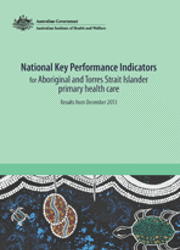Summary
This is the second national report on the Indigenous primary health care national Key Performance Indicators (nKPIs) data collection. Data for this collection are provided to the AIHW by primary health care organisations who receive funding from the Department of Health to provide services to Aboriginal and Torres Strait Islander people.
The purpose of the nKPIs is to improve the delivery of primary health care services by supporting continuous quality improvement (CQI) activity among service providers. The nKPIs also support policy and planning at the national and state and territory level by monitoring progress and highlighting areas for improvement.
The report presents data on 19 indicators (and 24 indicator measures) collected for 4 reporting periods over 2 years: June 2012, December 2012, June 2013 and December 2013. The number of organisations reporting increased substantially over the 4 reporting periods, from 90 in June 2012 to 207 in December 2013.
The indicators focus on chronic disease prevention and management, and on maternal and child health. There are 19 'process of care' measures and 5 'health outcomes' measures. The former are largely under the control of organisations and are therefore used to assess practices in primary health care. Health outcomes, on the other hand, are influenced by a wide range of factors beyond the immediate control of primary health care organisations.
The data show that there were improvements in most of the 'process of care' indicators (Table S1). In particular, national proportions for Indigenous Australians increased for the following 7 measures:
- proportion of babies with birthweight recorded
- Medical Benefits Schedule health assessments for children
- Medical Benefits Schedule health assessments for adults
- clients with type 2 diabetes who received an MBS GP Management Plan
- clients with type 2 diabetes who received an MBS Team Care Arrangement
- recording of smoking status
- recording of alcohol use status.
There were mixed results in the health outcomes indicators, with only minor improvements for some indicators, however, large changes in outcome indicators would not be expected over an 18 month period.
The results varied across jurisdictions, with organisations in Queensland and the Northern Territory continuing to perform better than other jurisdictions in most process-of-care indicators.
Implications
T he Department of Health noted the following implications of the results outlined in this report.
Trend data are now available on all nKPIs, with at least 2 data points for all indicators and 4 data points for 11 indicators:
- They show that improvements have occurred across most process-of-care indicators. These improvements should result in better health outcomes for Aboriginal and Torres Strait Islander people.
- Data show an increasing use of risk factor monitoring as well as increasing use of health checks and care planning by organisations.
- Of particular note is the finding that the organisations with better performance are spread across diverse geographic and service delivery environments. Small organisations can and often do perform well, as do a number of larger organisations.
- Wide variation within and between indicators indicate improvement possibilities across some organisations.
- The nKPI data is now robust enough to be used to identify areas of improvements. The need for continued good quality data provided by organisations is paramount to this.
- There is a range in performance across indicators. Service providers can compare their results with analysis on each indicator to inform areas for improvement. Prompt action can identify the reasons for poor results and then allow the development of strategies to improve quality of service.
- A number of key opportunities require further investigation and/or development to inform the continuing improvement of the nKPI system itself. These include the possible development of benchmarks, and investigation of data gathering and recording processes in areas such as immunisation and kidney function tests.
- The report highlights the need to further develop a national Continuous Quality Improvement (CQI) approach that supports organisations in improving primary health care delivery for Aboriginal and Torres Strait Islander people.



